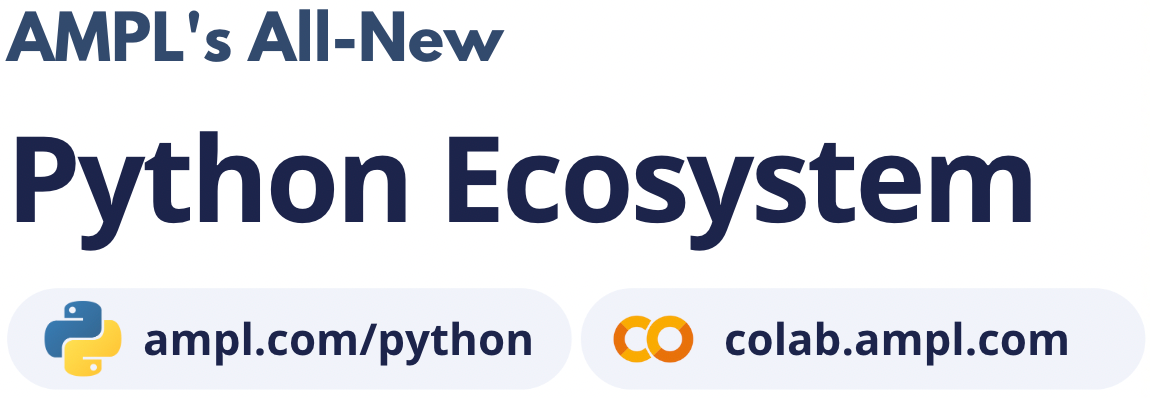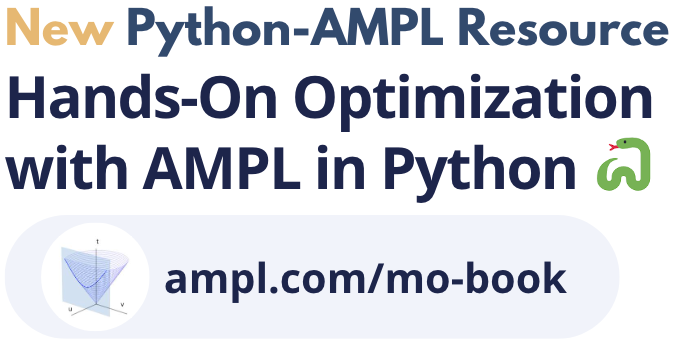Set#
- public class Set extends BasicEntity<SetInstance>#
Represents an AMPL set. In case of not indexed sets, this class exposes functionalities of a Java Set for accessing its elements. The members of the set can be strings, double numbers or
tuples. Moreover, the inheritedSet.getValuescan be used to get all the members inDataFrameclass.All these methods throw an
UnsupportedOperationExceptionif called for an indexed set.In case of indexed sets, use the method
Set.getto obtain the objects of typeSetInstance, from which to access all properties (see section Access to instances and values for further information on how to access set instances).Data can be assigned to the set using the methods
Set.setValues, or usingAMPL.setDataand an object of classDataFrame.
Constructors#
Set#
Set#
- protected Set(SetBase impl)#
Methods#
arity#
- public int arity()#
The dimension of s, or number of components in each member of this set
contains#
- public boolean contains(Object o)#
Check contents.
See
SetInstance.contains.Valid only for not indexed sets.
- Parameters:
o – Tuple to be searched for
- Returns:
True if the object is present
containsAll#
- public boolean containsAll(double[] c)#
Check if the sets contains all the elements in the collection c. Each element in the collection can be a double, a String, a Tuple or an array. In case of arrays, each array is considered as a Tuple.
Valid only for not indexed sets.
- Parameters:
c – The collection containing the elements to find.
containsAll#
- public boolean containsAll(int[] c)#
containsAll#
containsAll#
- public boolean containsAll(Collection<? extends Object> c)#
get#
- public SetInstance get()#
Get the set instance (for not indexed sets)
- Throws:
IllegalStateException– If the entity has been deleted in the underlying AMPL interpreter.UnsupportedOperationException– if the set is indexed
get#
- public final SetInstance get(Object... key)#
Get the set instance corresponding to the specified key. See Access to instances and values for further information on how the key can be specified.
- Throws:
IllegalStateException– if the entity has been deleted in the underlying AMPL interpreterIllegalArgumentException– if trying to access an instance with the wrong number of keys (seeEntity.indexarity)
- Returns:
The instance corresponding to the specified key. Null if the specified key is not present.
get#
- public final SetInstance get(Tuple key)#
Get the set instance corresponding to the specified key (passed as a Tuple). See Access to instances and values for further information on how the key can be specified.
- Parameters:
key – The indexing tuple of the instance to be found
- Throws:
IllegalStateException– if the entity has been deleted in the underlying AMPL interpreterIllegalArgumentException– if trying to access an instance with the wrong number of keys (seeEntity.indexarity)
- Returns:
The instance corresponding to the specified key. Null if the specified key is not present.
getValues#
impl#
- SetBase impl()#
isEmpty#
- public boolean isEmpty()#
Return true if the set is empty.
Valid only for not indexed sets.
iterator#
- public Iterator<SetInstance> iterator()#
members#
- public MemberRange members()#
If the set is not indexed, get the iterator for this set, allowing easy access to its elements, as in:
ampl.eval("set A := {'a', 'b', 3};"); for (Object o : ampl.getSet("A")) { // ... }
- Throws:
UnsupportedOperationException– if used on an indexed set
setValues#
setValues#
- public void setValues(Tuple[] objects)#
Assign values to the this set.
See
SetInstance.setValuesfor the usage instructions.
setValues#
setValuesFlattened#
- public void setValuesFlattened(double... objects)#
setValuesFlattened#
size#
- public int size()#
Get the size of the set (number of elements) (valid only for not indexed sets)
- Throws:
UnsupportedOperationException– if used on an indexed set


